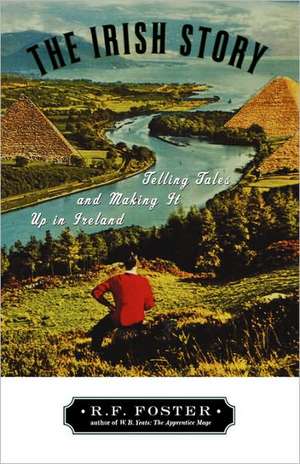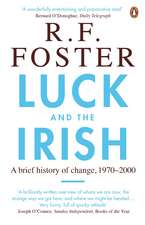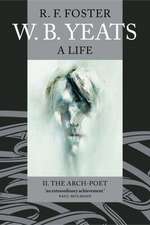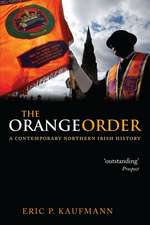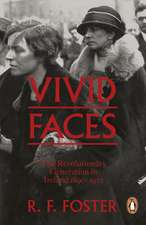The Irish Story: Telling Tales and Making It Up in Ireland
Autor R. F. Fosteren Limba Engleză Paperback – 25 sep 2007
| Toate formatele și edițiile | Preț | Express |
|---|---|---|
| Paperback (2) | 80.80 lei 31-37 zile | |
| Oxford University Press – 25 sep 2007 | 80.80 lei 31-37 zile | |
| Penguin Books – 4 sep 2002 | 81.87 lei 6-8 săpt. |
Preț: 80.80 lei
Nou
Puncte Express: 121
Preț estimativ în valută:
15.46€ • 16.19$ • 12.79£
15.46€ • 16.19$ • 12.79£
Carte tipărită la comandă
Livrare economică 25-31 martie
Preluare comenzi: 021 569.72.76
Specificații
ISBN-13: 9780195168877
ISBN-10: 0195168879
Pagini: 304
Dimensiuni: 140 x 218 x 20 mm
Greutate: 0.39 kg
Editura: Oxford University Press
Colecția OUP USA
Locul publicării:New York, United States
ISBN-10: 0195168879
Pagini: 304
Dimensiuni: 140 x 218 x 20 mm
Greutate: 0.39 kg
Editura: Oxford University Press
Colecția OUP USA
Locul publicării:New York, United States
Recenzii
Reading Foster will sharpen your wits, leave you less likely to be duped by a story simply because it's told with a brogue.
Erudite and acerbic
Interesting, suggestive, mostly urbane, sometimes scathing.
Foster is a formidably funny and exciting writer, and it is a joy to watch as he charmingly herds each sacred cow to the slaughter.
Foster's superb portrait of the essayist Hubert Butler evokes an Irish Orwell; someone who for 60 years, at times reviled and at others ignored, spoke subtle, lucid truth.... Foster eviscerates what he sees as the cramping of the past in memoirs by Frank McCourt and Gerry Adams.... What Foster is really going after is not politics but a way of thinking and writing 'for an audience in search of reaffirmation rather than dislocation
Roy Foster is one of the most elegant and probing writers on Irish topics and also one of the most controversial. In Ireland itself, where history matters, Foster attracts Cornel West-scale publicity. He's the leading figure in a generation of 'revisionist' historians who have chipped away at what they describe as Irish myths. American readers are about to get a fresh taste of his stiletto pen and icon-smashing habits when his latest book, 'The Irish Story' hits these shores.
The outpouring of literature from Ireland has ever been enormous, and nothing seems to stem it, or to reduce the excellence of the best of it. Occasionally, amid that plenitude there emerges a book that startles and provokes to the point of demanding extraordinary attention. Such a book is The Irish Story.... I can think of no book that more clearly, provocatively and intelligently delineates the important underlying contemporary truths of Ireland and the Irish than this insightful, courageous and splendid work.
Foster is a graceful stylist, a droll wit, and a serious scholar. For the student of Irish history, this volume of revisionist history is often refreshing in its genteel insolence and polite polemics. It provides a dozen thoughtful essays, many blending biography and literary criticism with skeptical scrutiny of traditional historiography.
The whole book is written in lively, colorful, and exact prose.... As Foster has ruefully reflected, his nation is 'too prone to mistake verbiage for eloquence, fanaticism for piety, and swagger for patriotism.' These are faults not particular to the Irish, although the Irish might be said to be especially spectacular in their use.
Interesting, suggestive, mostly urbane, sometimes scathing.... Foster...despises most of the acts of commemoration. He speaks of 'commercialized theme-park history' purveyed by 'commemoralist historians.' He is offended by officially sponsored bad taste and by what he regards, on the part of many of his professional colleagues, as bad history. Some of the episodes he recounts make for painful reading, especially if you are Irish. It is exasperating to find tragic acts and sufferings turned to commercial use by the Irish Tourist Board, the government and local politicians.
Foster's writing, which is lively and unsparing, has already inspired much commentary in the UK and in Ireland.
Erudite and acerbic
Interesting, suggestive, mostly urbane, sometimes scathing.
Foster is a formidably funny and exciting writer, and it is a joy to watch as he charmingly herds each sacred cow to the slaughter.
Foster's superb portrait of the essayist Hubert Butler evokes an Irish Orwell; someone who for 60 years, at times reviled and at others ignored, spoke subtle, lucid truth.... Foster eviscerates what he sees as the cramping of the past in memoirs by Frank McCourt and Gerry Adams.... What Foster is really going after is not politics but a way of thinking and writing 'for an audience in search of reaffirmation rather than dislocation
Roy Foster is one of the most elegant and probing writers on Irish topics and also one of the most controversial. In Ireland itself, where history matters, Foster attracts Cornel West-scale publicity. He's the leading figure in a generation of 'revisionist' historians who have chipped away at what they describe as Irish myths. American readers are about to get a fresh taste of his stiletto pen and icon-smashing habits when his latest book, 'The Irish Story' hits these shores.
The outpouring of literature from Ireland has ever been enormous, and nothing seems to stem it, or to reduce the excellence of the best of it. Occasionally, amid that plenitude there emerges a book that startles and provokes to the point of demanding extraordinary attention. Such a book is The Irish Story.... I can think of no book that more clearly, provocatively and intelligently delineates the important underlying contemporary truths of Ireland and the Irish than this insightful, courageous and splendid work.
Foster is a graceful stylist, a droll wit, and a serious scholar. For the student of Irish history, this volume of revisionist history is often refreshing in its genteel insolence and polite polemics. It provides a dozen thoughtful essays, many blending biography and literary criticism with skeptical scrutiny of traditional historiography.
The whole book is written in lively, colorful, and exact prose.... As Foster has ruefully reflected, his nation is 'too prone to mistake verbiage for eloquence, fanaticism for piety, and swagger for patriotism.' These are faults not particular to the Irish, although the Irish might be said to be especially spectacular in their use.
Interesting, suggestive, mostly urbane, sometimes scathing.... Foster...despises most of the acts of commemoration. He speaks of 'commercialized theme-park history' purveyed by 'commemoralist historians.' He is offended by officially sponsored bad taste and by what he regards, on the part of many of his professional colleagues, as bad history. Some of the episodes he recounts make for painful reading, especially if you are Irish. It is exasperating to find tragic acts and sufferings turned to commercial use by the Irish Tourist Board, the government and local politicians.
Foster's writing, which is lively and unsparing, has already inspired much commentary in the UK and in Ireland.
Notă biografică
Roy Foster is Professor of History and a Fellow of Hertford College, Oxford. He is the author of W. B. Yeats: The Apprentice Mage and Modern Ireland, and is the editor of The Oxford History of Ireland.
